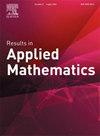A numerically stable formula for the conditional distribution of the residual service time in the Mn/PH/1 queue
IF 1.4
Q2 MATHEMATICS, APPLIED
引用次数: 0
Abstract
In this paper, we consider an queue, where arriving customers decide whether to join the queue or not join based on the queue length at arrival instants. Kerner (2008, Stochastic Models) studies the queue, and derives a recursive formula for the Laplace-Stieltjes transform (LST, for short) of the conditional distribution of the server’s residual service time, given the queue length at arrival instants. This paper aims to analyze the queue in a much simpler way than the previous studies, and to show that our LST of the conditional distribution of the server’s residual service time is given in a more numerically stable form than that of the previous studies, specifically by avoiding the indeterminate form such as . We then use the formula to compute the customers joining probabilities in Nash equilibrium.
Mn/PH/1队列剩余服务时间条件分布的数值稳定公式
本文考虑一个Mn/PH/1队列,其中到达的顾客根据到达时刻的队列长度决定是否加入队列。Kerner (2008, Stochastic Models)研究了Mn/G/1队列,在给定到达时刻队列长度的情况下,导出了服务器剩余服务时间条件分布的Laplace-Stieltjes变换(简称LST)的递归公式。本文旨在以比以往研究简单得多的方式分析Mn/PH/1队列,并表明我们的服务器剩余服务时间条件分布的LST以比以往研究更稳定的数值形式给出,特别是避免了0/0等不确定形式。然后,我们使用该公式来计算纳什均衡中的顾客加入概率。
本文章由计算机程序翻译,如有差异,请以英文原文为准。
求助全文
约1分钟内获得全文
求助全文
来源期刊

Results in Applied Mathematics
Mathematics-Applied Mathematics
CiteScore
3.20
自引率
10.00%
发文量
50
审稿时长
23 days
 求助内容:
求助内容: 应助结果提醒方式:
应助结果提醒方式:


